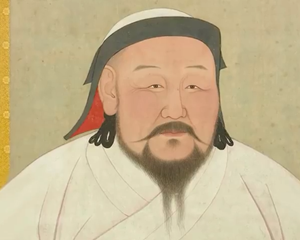The conquest took three years. But it wasn't three years marked by the usual Mongol atrocities.
征服花了三年时间,不过用的并不是蒙古人典型的暴力方式。
Kublai by now firmly believed what his Chinese advisors had taught him about a ruler's codependence with the ruled.
此时的忽必烈坚信他的中国顾问们教给他的“水能载舟亦能覆舟”的道理。
Which meant not killing new subjects during conquest, but treating them with mercy.
这就说明在征服的过程中不能杀死新的人民,而是要以仁慈来感化他们。
For the Mongols, this was seriously cuckoo stuff; like if a modern general suggested his army tried replacing its bullets with Black Forest gateau.
对蒙古人来说这简直是无稽之谈,就像一位现代将军建议他的军队用黑森林蛋糕来代替子弹去打仗。
But Kublai was serious. Terror was to be toned down, and pillaging was out. And so a new era of Mongol warfare was born.
但人家忽必烈同志是认真的。恐怖的气氛要缓和下来,抢劫也要取消,于是蒙古战争的新纪元就这样诞生了。
By 1256, the Dali Kingdom had fallen.
1256年,大理王国灭亡了。
Buoyed by his brother's success, Mongke began planning an invasion of southern China, where the Song Dynasty still held out.
在他的兄弟成功的鼓舞之下,蒙克开始计划入侵中国南部,当时宋朝仍在那里坚守着。
But such an undertaking required time, time in which Kublai wasn't just gonna park his thumb up his ass and wait for his brother to say "go".
但这需要时间,在这段时间里忽必烈不会束手束脚等着他的哥哥说“走”。
So Kublai left Dali and returned north to embark on his most-famous project of all.
忽必烈离开了大理,回到北方开始了他最著名的项目。
Xanadu is legendary in the English-speaking world. Although this is mostly due to Coleridge's poem, it deserves the hype.
“上都”在英语世界是一个传奇,虽说它主要因柯勒律治的诗而闻名,但它值得炒作。
Kublai's new capital was designed on Chinese principles of feng shui, perfectly placed in relation to mountains and rivers, between the agricultural lowlands and Mongolian steppe.
忽必烈的新的首都是按照中国的风水原则设计的,完美地坐落在高山和河流之间、农业低地和蒙古草原之间。
Great walls and towers enclosed a city of 200,000 people, all laid out on a classic Chinese square plan.
长城和塔楼环绕着这座拥有20万人口的城市,所有的建筑都是按照中国古典的四方形来布局的。
At its heart sat a palace almost beyond imagination, a "stately pleasure dome" complete with its own hunting grounds.
在它的中心坐落着一座超乎想象的宫殿,一个带有狩猎场的“庄严的安乐宫”。
It was an expression of Kublai's love for Chinese style… but also of his power. Power that was growing by the minute.
表达了忽必烈对中式风格的热爱,也展现了他的力量,时刻都在增长的力量。
In 1258, Kublai invited leaders of both Buddhist thought and Daoism to Xanadu for a grand religious debate.
1258年,忽必烈邀请佛教和道教的领袖到上都参加一场盛大的宗教辩论。
There, he listened to both sides, before eventually declaring that Buddhism had won and making it Northern China's official religion.
他在那里听取了两大宗教的教义伦理,最终宣布佛教取得了胜利,并使之成为了中国北方的官方宗教。
It a decision that would play a huge part in Buddhism's spread across East Asia.
这一决定对佛教在东亚的传播起到了重要的作用。
But as Kublai's stature grew, Mongke began to take notice.
然而,随着忽必烈地位的提高,蒙克开始注意到他了。
The same year as the religious debate, he sent agents to Xanadu, who began purging Kublai's Chinese advisors on trumped-up charges.
在宗教辩论的同年,蒙克派特工到了上都,开始以莫须有的罪名清洗忽必烈的中国顾问。

For a moment, it looked like there could be civil war between the brothers.
有那么一刻,两兄弟之间似乎要发生内战。
But Mongke backed off at the last moment, realizing he needed his brother for the coming fight against the Song.
而蒙克在最后一刻退却了,因为他意识到自己需要他的兄弟来对抗宋朝。
They patched things up and, in 1259, finally invaded southern China.
他们最终于1259年入侵了中国南部。
Sadly, though, the civil war hadn't been stopped. It would now just take place between different siblings.
然而不幸的是,内战并没有停止,只不过发生在不同的兄弟姐妹之间。
On August 11, Mongke died while besieging a Song city. Immediately, two candidates for his successor presented themselves.
8月11日,蒙克在围攻宋城时牺牲,他的继任者马上出现了两名候选人。
Up in Mongolia proper, Kublai's younger brother Arigboge was at the head of a conservative faction, displeased with Mongke's China war.
在蒙古本土,忽必烈的弟弟阿里不哥是保守派系的领袖,他对蒙克的对华战争非常不满。
Down in the south, there was Kublai, even now fighting the war his brother had so long dreamed of.
在南方,忽必烈正在为他哥哥梦寐以求的战争而战。
There was only one way a Khan could ever be chosen between the two siblings. They were going to have to fight.
这两兄弟之间只有一个选择:战斗吧!
The Wrath of the Khan If anyone ever had any doubt about Kublai's ambitions, they were quickly dispelled after Mongke's death.
如果说有人曾怀疑过忽必烈的野心,那么在蒙克死后,这些怀疑很快就烟消云散了。
As soon as he could, Kublai made a peace treaty with the Song.
忽必烈很快就和宋国签订了和平条约。
Then he quick marched back up north to Xanadu and, on May 5, 1260, called a kuriltai.
之后他迅速向北进军回到了上都,并于1260年5月5日召开了一次库里台大会。
It ended with Kublai being elected great Khan and a proclamation drawn up in classical Chinese.
最后,忽必烈被选为大汗,并发表了一份用文言文撰写的宣言。
But while Kublai's meeting had named him leader, this wasn't the same as him actually leading the Mongols.
不过忽必烈的会议任命他为领袖,这和他实际领导蒙古人是不一样的。
Up in Karakorum, Arigboge responded to the news by essentially going "oh, yeah?" and holding his own kuriltai which named him great Khan.
在喀喇昆仑,阿里不哥对这个消息的反应大致是“哦,嗯?”然后继续召开他自己的库里台大会,那里他就是伟大的可汗。
It was a stalemate. Kublai now controlled the biggest, richest part of the empire, while Arigboge ruled the homeland.
这是一种僵局。此时忽必烈控制着帝国最大、最富有的地区,而阿里不哥则统治着蒙古腹地。
It's arguable that this stalemate was never really resolved.
可以说,这一僵局从未真正得到解决。
Although Kublai defeated Arigboge's forces in 1264, the north of the empire remained out of his control.
虽然忽必烈于1264年击败了阿里不哥的军队,但帝国北部仍在他的控制范围之外。
The conservative faction replaced Arigboge with a guy called Kaidu, and Kaidu basically just did his own thing, like he was separate from Kublai's empire.
保守派用一个叫海都的人取代了阿里不哥,海都只是做他自己的事,就好像和忽必烈的帝国是分开的。
It's around this point that we can stop thinking of the Mongol Empire as a single entity, and more like the collection of Khanates it would eventually become.
正是由于这一点,我们可以不再认为蒙古帝国是一个单一的实体,而更像是它最终变成的汗国的合体。
Still, nominal control of the homeland was good enough for Kublai.
尽管如此,对忽必烈来说对帝国名义上的控制已经够可了。
Arigboge defeated, he went straight back to war with the Song Dynasty.
阿里不哥战败后,忽必烈直接和宋朝开了战。
It was a hell of a fight. Although only in control of southern China, the Song could still call up an army of one million men.
那是一场可怕的战争。宋朝虽然只控制了中国南部,但仍能召集一百万大军。
They had gunpowder, catapults, siege engines. A navy with the biggest ships in human history.
他们有火药,弹弓,攻城机,拥有人类历史上最大船只的海军。
It was a fight Kublai had no guarantee he could win.
这是一场连忽必烈都无法保证能赢的战争。












